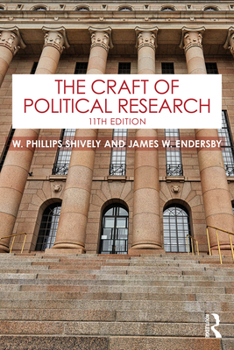The Craft of Political Research
Select Format
Select Condition 
Book Overview
The Craft of Political Research is a nontechnical introduction to research design and analysis in political science, emphasizing the choices we make when we design a research project and analyze its results. The book's approach centers on asking an interesting research question, then designing inquiry to eliminate as many alternative explanations as possible.
How do we develop theory, and what constitutes a good research question? How do we operationalize measures and gather evidence to answer a question? How do we analyze our data? Students are introduced to such topics as multidimensional concepts, levels of measurement, validity, reliability, random and non-random measurement error, sampling, case selection, causality, experimental and quasi-experimental design, statistical inference, and regression and correlation analysis. Throughout, the emphasis is on understanding the "back story" of analysis--why do we measure in a particular way, why do we choose one design as against another, why do we conduct our analysis as we do.
Emphasizing the internal logic of research methods, the greatest strength of the book is its clarity and the broad range of political science examples provided. It works at a conceptual level, seeking an understanding of the principles that underlie techniques and the reasons why we choose them.
New to this edition:
New and revised examples from the US, UK, Canada, Latin America, and Africa among others, and updated international data from organizations such as the World Bank and the United Nations. Separate chapters on causality and research design, with more discussion of each component of the political science research process New section on indexes and scales that reviews ways to improve reliability and validity of measures by combining several variables New sections reviewing collection of publicly available data including downloadable sources of quantitative data New material on internet surveys and other contemporary techniques used in political science research.





